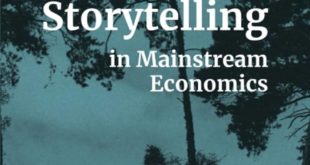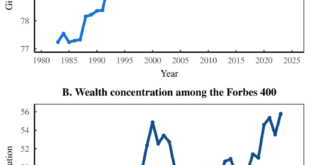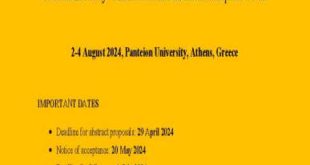Abstract. This note responds to Arne Heise’s critque of my article on Keynes’s denial of conflict in The General Theory. Heise’s response fails to show Keynes addressed conflict and makes several meritless criticisms regarding my treatment of Keynes and Keynesianism. It also fails to recognize the purpose of my article which was to show conflict […]
Read More »Chicago economics — nothing but pseudo-scientific cheating
from Lars Syll Unlike anthropologists … economists simply invent the primitive societies we study, a practice which frees us from limiting ourselves to societies which can be physically visited as sparing us the discomforts of long stays among savages. This method of society-invention is the source of the utopian character of economics; and of the mix of distrust and envy with which we are viewed by our fellow social scientists. The point of studying wholly fictional, rather than actual...
Read More »Rethinking conflict inflation: the hybrid Keynesian – NAIRU character of the conflict Phillips curve
This paper presents a new formulation of conflict inflation labeled the “pass-through” approach, which contrasts with the existing “pressure balance” approach. The model generates Phillips styled inflation – unemployment dynamics that are a hybrid of Keynesian and NAIRU dynamics. Conflict inflation arises when economic activity rises above the consistent claims activity level, and it is […]
Read More »The increasing collusion between . . . . . .
from a comment by Ikonoclast “A truth is permitted only a brief victory celebration between the two long periods where it is first condemned as paradoxical and later disparaged as trivial.” – Arthur Schopenhauer. As they break new ground, the Capital as Power theoreticians will encounter the “Schopenhauer Effect” over and over. When you point out something clearly for the first time, or even again after a long interregnum when few could see it, then everyone will say, “Oh, we always knew...
Read More »Wealth catapulted up
from Blair Fix and current issue of RWER Speaking of competition and losers, Ronald Reagan set the tone of the neoliberal era when, in 1981, he fired 11,000 striking air-traffic controllers (Houlihan, 2021). The message? Workers were losers who would be subjected to the discipline of competition. Reagan called it ‘morning in America’. But really, it was ‘morning for American big business’. Today, we are well into the next-day’s hangover, and we know how the party played out. For workers,...
Read More »Workgroup for Marxist Macroeconomic Modelling – CfP for the 17th WAPE Forum, 2-4 August, Panteion University
Workgroup for Marxist Macroeconomic Modelling Call for Papers for the 17th Forum of the World Association for Political Economy ‘Political Economy vs Economics in a turbulent multipolar world 2-4 August 2024, Panteion University, Athens, Greece Macroeconomic modelling plays an important role for both socialist and capitalist economies. Particularly for the former macroeconomic modelling is crucial for economic planning. Macroeconomic modelling – geared especially towards...
Read More »The need for a new economic paradigm
from Giandomenico Scarpelli and current issue of RWER As documented in the previous paragraph, in recent years it finally seems that most orthodox economists have become more aware of the catastrophic outcomes of climatic disturbances; but at this point the traditional policy they recommend could be insufficient to meet the goals set at international level. In fact, that policy consists mainly of pollution permits and carbon taxes, but if the permits are offered with great generosity and...
Read More »Big business in Australia faces less competition than almost anywhere else – and likes it that way
My latest in The Guardian Supermarkets are the public face of inflation. Every time we go shopping, we are reminded that just about everything costs more than it did before Covid. And shrinkflation, once subtle and insidious, has become blatant. A standard chocolate bar is now what used to be called “fun size”. A natural response, particularly for politicians seeking to divert attention from themselves, is to blame greed and monopoly power. Explanations based on greed are rather...
Read More »Of the making of books there is no end
That’s what the Bible (or at least, the preacher in Ecclesiastes) says, and sometimes I feel as if that’s right. But right now, I’m basking in the glow of having returned final proofs for Public Policy and Climate Change: Politics, Philosophy and Economics, a text to appear in the Lecture Notes in Economics and Policy series put out by World Scientific Publishers. As well as approving the proofs, I produced an index, using a program with the self-explanatory title PDF Index...
Read More »Weekend read – Enlightenment epistemology and the climate crisis
from Asad Zaman Introduction At first glance, it appears that industrialization, with its rampant overproduction and overconsumption, stands as the primary antagonist in our climate crisis narrative. However, this surface-level perception overlooks a more profound shift that lies beneath: an epistemological revolution birthed in the European Enlightenment. This era marked a pivotal transition in our relationship with the planet, from Mother Earth to a dead machine. Turbayne (1962)...
Read More » Heterodox
Heterodox




